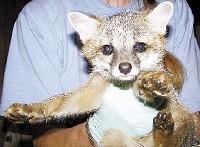Earlier this year, Mississippi native Valery Smith received a call that a baby skunk, about the size of a large rat, was wandering around someone’s carport. The caller said he’d looked for the skunk’s parents and siblings but found none. Assuming the skunk had been abandoned, Smith rushed to rescue the baby, later dubbing it “Flower.”
As director of the 10-year-old nonprofit Mississippi Wildlife Rehabilitation, Smith receives calls like this one nearly every day.
“We teach [the animals] what they need to know to survive when they’re released back into the wild,” says Smith. “We normally don’t keep anything longer than three months, and we never talk to them. We don’t want to acclimate them to the sound of human voices.”
Smith says she and about 30 volunteers rescue a total of 600 animals a year at their Hernando-based facility. This year, they’ve rescued baby raccoons, beavers, minks, owls, hawks, opossums, foxes, and more.
Most of the rescues start with calls from concerned Mississippi residents, ranging from reports of injured animals, such as the baby grey fox that was orphaned after a dog attack, to reports of abandoned baby birds.
Smiths warns, however, that many baby birds that appear to be abandoned may just be learning to fly.
“The baby birds are fledging, and they’re jumping from the nest as they learn to fly,” says Smith. “People see these little birds on the ground and think they’re injured or abandoned, but the mother is somewhere nearby. We just tell them to keep their cats in the house.”

Smith also gets calls from people in Memphis. Due to state law, she isn’t allowed to assist any mammals across state lines, but she can rescue songbirds and birds of prey in Memphis, since they’re protected under the federal Migratory Bird Act.
“It’s a violation of federal law to cross state lines with mammals,” says Smith. “They make these laws to keep the animals from being exploited but also to prevent transfer of diseases across state lines.”
Some animals are unable to be released back into the wild due to permanent injury. Smith is required to apply for a permit to keep them as “educational animals,” to be used in school outreach programs or in fostering other rehabbed animals.
“I have a red-tailed hawk [named “Spirit”] that’s over 18 years old. She was shot in 1989 and sustained a spinal cord injury,” says Smith. “I have a special permit to use her to foster baby red-tails.”